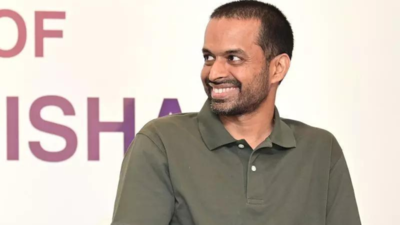- News
- City News
- Hyderabad News
- Unless you are rich, don’t make your child a sportsperson: Badminton coach Pullela Gopichand
Trending
Unless you are rich, don’t make your child a sportsperson: Badminton coach Pullela Gopichand
Renowned badminton coach Pullela Gopichand advises parents against encouraging their children to pursue sports professionally unless they come from affluent backgrounds. He highlights the lack of a safety net and adequate career opportunities for athletes post-retirement, emphasizing the need for societal changes to better support sportspersons.
HYDERABAD: One would have expected national badminton coach Pullela Gopichand to be overjoyed with the growing number of youngsters taking up sports as a profession, as a career, as a way of life. But the former All England champion says parents must think twice before letting their children dream about becoming professional sportspersons.
In a freewheeling chat with TOI, the man who single-handedly turned India into a badminton superpower, said, "I advise parents not to put their children in sports. We are not in a position to offer sports as a career. Unless the children are from rich backgrounds or have a family business, it is not advisable for children to take up sport."
His contention is simple. Very few make it big. Those who don't break into the elite rung of players, lack the skills to survive without sports after they retire at around 30.

"Thanks to Prime Minister Narendra Modi's positive inputs, sports has taken the centre stage in the nation's psyche. But the reality of sport is that less than 1% of people who take a sport end up having it as a profession or career," he says. "In sports like cricket, which is like a religion in our country, this number could be marginally better, but in essence sport would mean that a very small percentage of them make it. Where do we end up? What are the returns of the people who have made it?"
Sitting in his academy office in Hyderabad, a large glass window separating him from the playing courts where future champions are practicing, he says, "Olympic medalists who work in the Railways, RBI, Income Tax, police or a PSU have a lower rank than a civil servant who gets to reap benefits of his learning till he's 60. The Olympic medalist who has burned himself out, will have to call the civil servant ‘sir' or ‘madam'. They are at the mercy of the officer, hoping they will have people who will respect sportspersons who won medals for the country. And you may also find a boss with a negative mindset towards sportspersons."
He wondered if those who represented the country should be at the mercy of society where they may or may not get respect. "Think of what has happened to hundreds of people who have represented the country in the last 20 years in various sports, won medals… Where are they today? What is their future? What is their earning capacity?"
He gives the example of sprinter Jyoti Yarraji – a 2022 100 metres silver medallist from the Hangzhou Asian Games – who has been making numerous appeals for a proper job. He is also disappointed with how hockey stars like Dhanraj Pillay and Mukesh Kumar and shooter Vijay Kumar have been accommodated after they achieved so much for the country. "Going by what they have done for the country, is this the right kind of reward they deserve?" he asks. "If this is the case, how can we encourage our children to take up sport?"
Former hockey captain Mukesh Kumar told TOI that even national-level hockey players are not getting jobs today. "In our days, we used to get some job or the other, but now many top PSUs and banks have stopped recruiting hockey players," he says. "The situation is depressing."
Pullela Gopichand believes that if we really want to produce more professional sportspersons, then society must create a safety net around them. "After playing for many years, there's a lot of learning that sport gives," he says. "But to survive, these sportspersons also need other skills. Like spoken English presentation skills, and more importantly, a motivation to do something different in life from what they're used to (once they retire). A person who has the intelligence to figure out things on the field, who can work with the team, who has the discipline to improve himself to world level surely has the capabilities and the potential to learn new skills. Often, just the motivation is missing."
End of Article
FOLLOW US ON SOCIAL MEDIA










